A water heater is the necessity for any home. When you are overloaded with excessive options, and you find difficulty in choosing what is best for you, the selection guide comes for your rescue! This article will guide you in choosing the best water heater for your home.
What is a water heater?
Water heaters are commonly known as geysers. A perfect water heater is the one that will not only provide you with hot water but also take care of your pocket i.e. save electricity bill. Thus, it has to be both – work efficient and energy efficient. According to the research paper “Energy Efficient Geyser” developed by ‘Rsm Thomas, Xiaohua Xia & Jf Zhang’, approximately 40% of the domestic energy consumption is caused by geysers.
How does a water heater work?
A hot water heater uses energy to raise the temperature of cold water coming from the municipal supply or from the storage tank. Most commonly, hot water is stored in a tank, but in case of a tankless water heater, the water is heated as and when it is needed.
The primary function of a water heater is to heat the water and deliver it safely at the faucets and other appliances. A cold-water pipe feeds the water heater, where the water is warmed by gas or electric heating elements. The heated water then comes out and is directed to fixtures and appliances like sink, tub, and shower in the house. As water heaters use gas or electricity, you need to be extremely careful while dealing with them.
To make a wise choice, one must be very clear about different types of water heaters and their mechanism for heating the water.
Before understanding various types of water heater, you need to know about the water supply system.
Water supply system in a house can either be direct water supply system or indirect water supply system. In direct water supply system, potable water is available at all faucets (taps) directly from rising main or municipal supply. There is a supply of cold water through these systems. In indirect water supply system, potable water is initially stored in a storage tank and later made available at all the faucets (taps).
Water heaters are available in different varieties. So, let us have a look at the various types of heater.
Different Types of Water Heater
The classifications of water heater is based on the fuel it uses,
01. Electric Water Heaters
a) Storage Electric Water Heaters
b) Tankless Electric Water Heaters
02. Gas Water Heaters
a) Storage Gas Water Heaters
b) Tankless Gas Water Heaters
03. Solar Water Heaters
a) Passive Solar Water Heating System
b) Active Solar Water Heating system
Let us discuss the above mentioned types of water heaters in detail.
01. Electric Water Heaters
Electric water heaters are the type of water heaters that uses electricity to heat the water so as to supply hot water in the home. There are three types of electric water heater:
a) Storage Electric Water Heaters
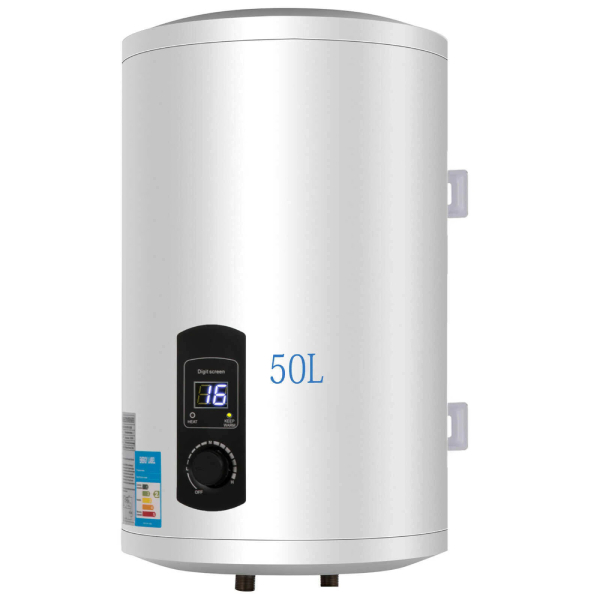
Storage electric water heaters contains storage tank where water is filled, heated, stored and then distributed. Electricity is used as a heating source in storage electric water heaters.
b) Tankless Electric Water Heaters
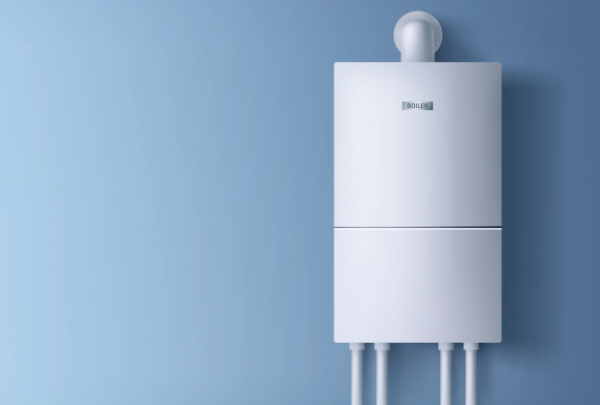
Tankless electric water heaters consist of an electric element that heats the flowing water available from source. Such water heaters do not require a storage tank.
02. Gas Water Heaters
Gas water heaters can run on household Liquefied Petroleum Gas (LPG) cylinders as well as on Piped Natural Gas (PNG). The gas water heater must be installed at a location with adequate ventilation. It is not safe and advisable to place these heaters inside the bathroom as they emit harmful carbon monoxide. There are two types of gas water heaters:
a) Storage Gas Water Heaters
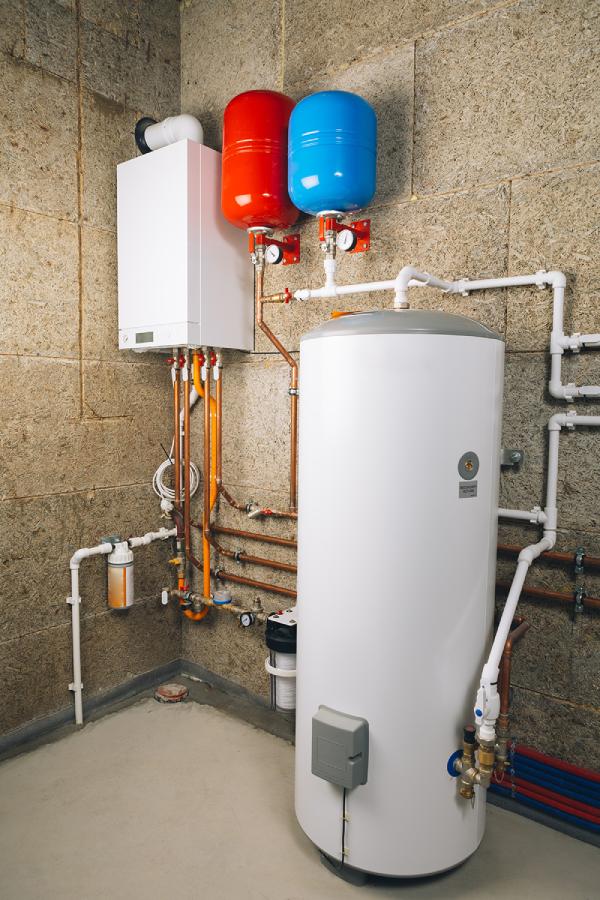
Storage Gas water heaters containa storage tank where water is filled, heated, stored and then distributed. Gas is used as a fuel used in such water heaters that heats the water.
b) Tankless Gas Water Heaters
Tankless Gas water heaters provide hot water directly at the faucet by using the gas as a fuel and without storing the water.
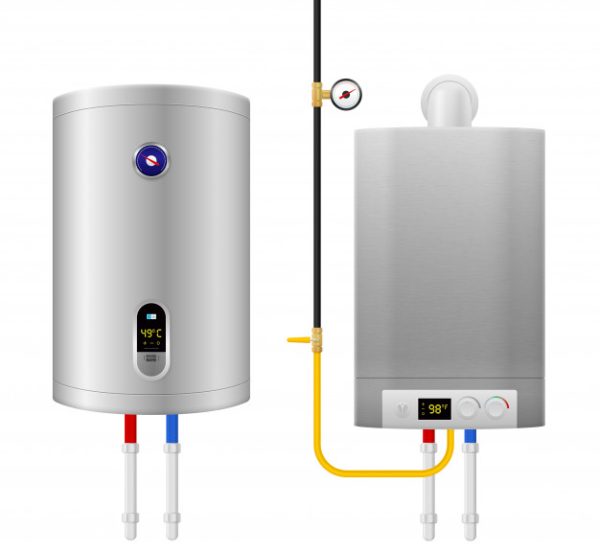
03. Solar Water Heaters
Ever-increasing energy prices and local tax incentives are making solar water heaters even more popular. Solar water heaters are the heaters that utilize solar energy obtained from the sun to heat the water for supplying hot water in house. It is installed on the terrace or on the roof where abundant sunlight is available for at least 5/6 hours a day.
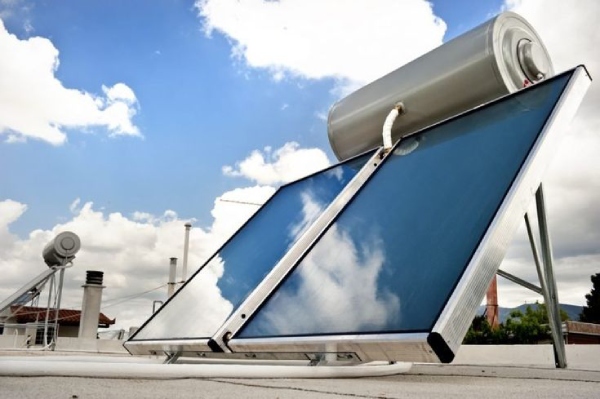
Generally, there are two types of solar water heating systems such as,
a) Passive Solar Water Heating System
The passive system works on the principle of gravity to circulate the water. In this system, tank is located at a higher level than the collector panels. Thus, the heated water moves upward in the tank and cooler water returns to the collector for heating. This system works without using the pump.
b) Active Solar Water Heating System
In active solar water heating system, the circulating pump is required for the circulation of water.
If you want to know more detail about solar water heaters, refer: Types of Solar Water Heater System for Your Home and their Benefits
Factors that Affect the Choice of Water Heater
While choosing a water heater, several factors may influence your decision: Following are the factors that will affect the selection of water heater:
01. Fuel type, availability and fuel cost
02. Compatibility with your home
03. Size of water heater
04. Energy Efficiency
05. Cost
06. Warranty and life of the heater
07. Quantity of Water
08. Its space requirement
Let us discuss the above mentioned factors in detail.
01. Fuel Type, Availability and Cost
Electricity, gas, oil, wood, natural gas etc are exhaustible and limited. They are termed as Conventional energy sources whereas solar energy, wind, hydro etc are inexhaustible and available in nature. They are Non-Conventional energy sources.
Opt for a fuel type which is easily available in your area and compare the fuel cost. The fuel cost may vary from place to place.
Most of the water heaters use electricity, natural gas or fuel oil. The current rate of electricity or fuel will determine unit’s operating cost. Solar energy is more efficient than natural gas or electricity and can be used in conjunction with a conventional water heater to reduce energy use.
02. Compatibility with Your Home
Electric water heater:
It is suitable for smaller spaces and for both tankless as well as storage system (because they do not require venting).
Gas water heater:
You have to check the availability of natural gas line at your home before you purchase a natural gas water heater. Even if the gas is easily available in your area, it can be expensive to install an additional gas line at your home.
Such heaters are suitable for large areas where enough space is available for venting and where gas is easily available as well.
Solar water heater:
It is most effective where significant sunshine is available year-around and enough space is available on the roof to install solar panels/plates.
As per the research paper “Temperature and Power Control of Water Geyser Using Learning Technique”(published on Research Gate by ‘Khadija Tul Kobra, Arnab Debnath & Proteeti Rawshan’), gas heater is still in use, but electric heater is more popular as it is more efficient, and requires less space for installation.
03. Size of Water Heater
Size of water heater depends on hot water used per head. Normally 15 to 30 litres (3.96 to 7.93 Gallon) hot water per head per day is required depending on weather and lifestyle.
a) Storage Water Heater
The right size of storage water heater for a family depends on its peak hour demand. Peak hours are usually early morning hours or evening hours. The table below represents a way to estimate the required capacity of water heater for a family of two adults and two children considering their peak hour demand i.e. in the morning when they are getting ready for the day’s activities.
Let us see how to calculate the peak hour demand. The following points should be considered while determining the peak hour demand,
- Number of people in your house
- Part of the day (Morning / Evening) you use the hot water.
The table indicates the total peak hour demand. It is better to choose a size bigger than the estimate done to ensure that enough hot water is available during peak hours and also when there are guest at home.
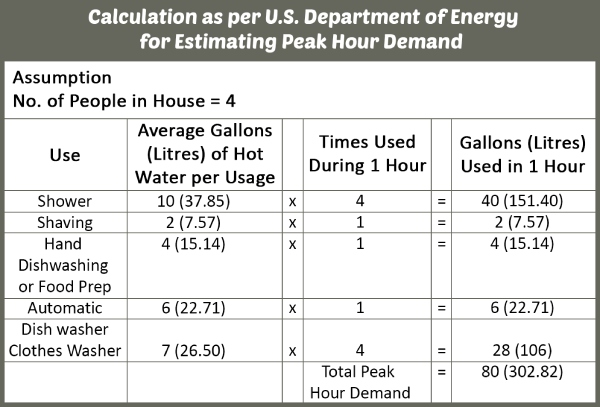
From the above table, we can make out that the total peak hour demand for this family is 80 gallons (302.82 litres). Therefore, this family would require a storage water heater with a first hour rating of 78 gallons (295.26 litres) to 82 gallons (310.40 litres). In hot weather obviously you will require less hot water. Again if you are accustomed to “Bucket” bath rather than shower, even then you will need less hot water. In India, for a family of 4, 100 litres should easily work.
b) Tankless Water Heater
The size of tankless water heater mainly depends upon,
- Flow Rate
- Temperature Rise
Flow Rate:
Proper sizing is also important while working with tankless water heaters. The delivery of hot water in tankless water heater is measured in L/M (Litre per Minute) or GPM (Gallon per Minute). Before choosing the size of a tankless water heater, first consider at how many plumbing fixtures would you expect to use hot water at a time.
For example, If you simultaneously expect to run hot water faucet with a flow rate of 3 litres (0.79 Gallon) per minute and shower head with a flow rate of 9 litres (2.38 Gallon) per minute, then, the flow rate through the tankless water heater needs to be at least 12 litres (3.17 Gallon) per minute.
Temperature Rise:
Temperature rise is determined by the difference between safe hot water temperature and cold-water temperature. For example, if you want 113 0F (45 0C) water temperature for use and your cold water temperature is 68 0F (20 0C), then you need45 0F temperature rise (113 – 68 = 45 or 25 0C).
As per the US Department of Energy, typically, 70 0F (39 0C) water temperature rise is possible at a flow rate of,
- 5 Gallon (18.93 Litres) per minute if Gas based Tankless water heater is used.
- 2 Gallon (7.57 Litres) per minute if Electric Tankless water heater is used.
04. Energy Efficiency
Once you have decided upon the type of water heater that best suits your needs, determine the one which is the most fuel efficient. The best indicator of a heater’s efficiency is its Energy Factor (EF). Energy factor is based on the amount of hot water produced per unit of fuel consumed over a typical day.
As per the research paper “Selecting a New Water Heater” published by US Government Agency of Energy Efficiency and Renewable Energy, higher the energy factor, better is the efficiency of water heater. The energy factor (EF) of various types of water heaters are,
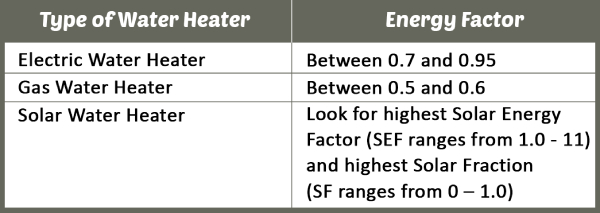
05. Cost
Compare the costs of heaters before purchasing them. Such comparison can be done by taking into consideration the following aspects:
- Base or capital cost: The price you pay at the time of purchasing
- Running and maintenance cost: Operating and maintenance cost of the water heater. It includes the cost of fuel and servicing cost.
Ideally, one should not only consider the one-time capital cost but should also think about its life cycle cost.
Let us calculate the approximate cost of different types of water heater having capacity of 100 Litres per day.
Cost of Electric Water Heaters:
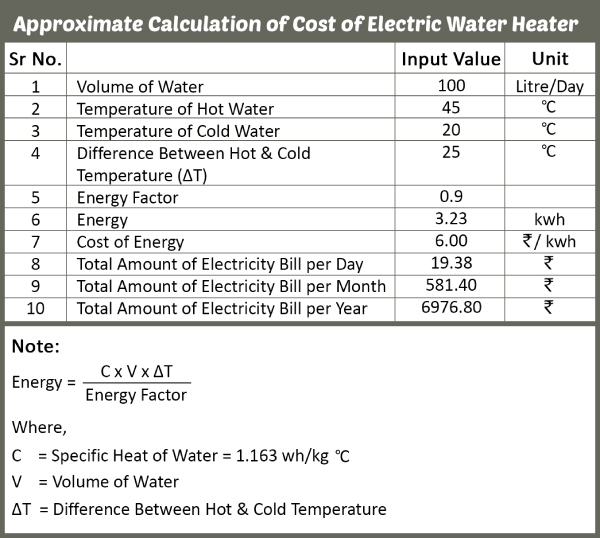
Cost of Gas Water Heater:
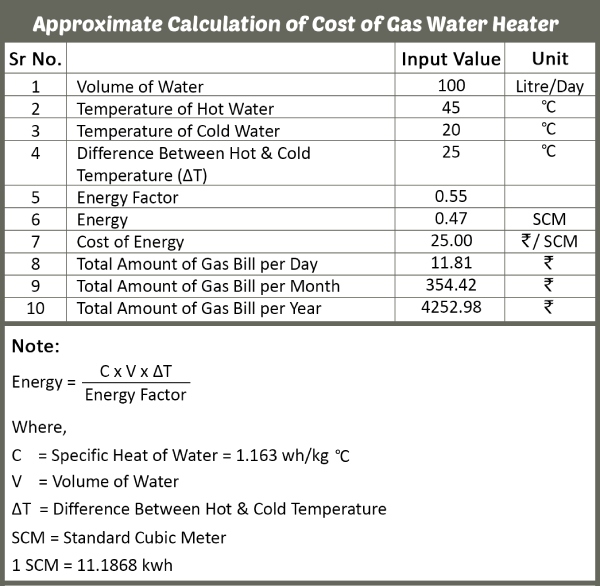
Cost of Solar Water Heater:
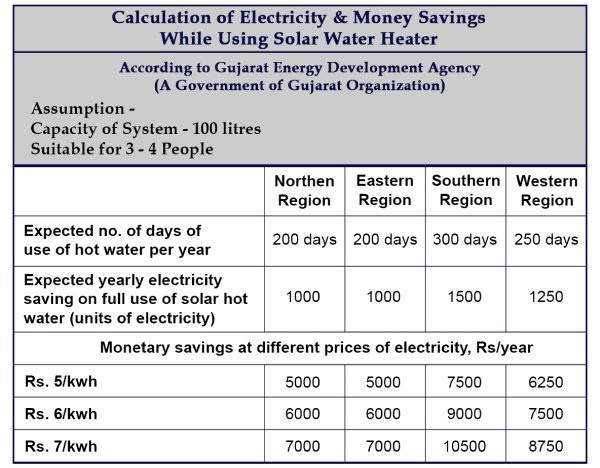
06. Warranty and Lifetime of Water Heaters
It is always advisable to spend a little extra money for a longer warranty. Because water heaters with shorter warranties may seem economical initially but you may end up spending more in the long run for its maintenance or even for some early replacements. Purchasing the one with longer warranty does not cost much and, if the water heater even fails early (i.e. in warranty period), it can be replaced.
Department of Mines, Minerals and Energy Office Directory, Virginia recommends that if your water heater is an older one – ten or more than 10 years old (life expectancy of water heaters is 10-15 years) consider replacing it with a higher efficiency model. Old water heaters are generally 50% less efficient.
Life of water heaters vary. Usually, storage water heater lasts for 10-15 years and tankless water heater lasts for over 20 years.
Finally, which water heater is best for your home?
Selecting a new water heater is an important decision that you and only you will have to make every 10 to 15 years. But before you go for purchasing a new water heater, please do educate yourself regarding the options available so that you can easily make a selection of an efficient water heater that meets your needs.
There are several factors such as availability of sunshine, better efficiency & control, less heat loss from the storage tank, etc. which plays a major role while choosing a solar system over other options. A large family will be paid back better on the investment in a solar system than a family of two because a larger family will obviously need more hot water than a smaller one.
If your budget is not adequate for solar water heating system then you should go for nonsolar options i.e. gas water heaters or electric water heaters. Storage water heaters, also known as conventional water heaters, are the most common type of water heater but not the most efficient ones. They use more energy as they keep water in large tank hot at all time.
Tankless water heaters are also known as on Demand, Instantaneous, point of use water heaters because they heat water only when it is needed. Such heaters are usually more efficient than a storage tank water heater.
The perfect water heater is a relative term because it can differ from place to place and from family to family. So, to get a best water heater, one should consider all the aspects that have been discussed here and then make a choice accordingly.
Image Courtesy: Image 4


